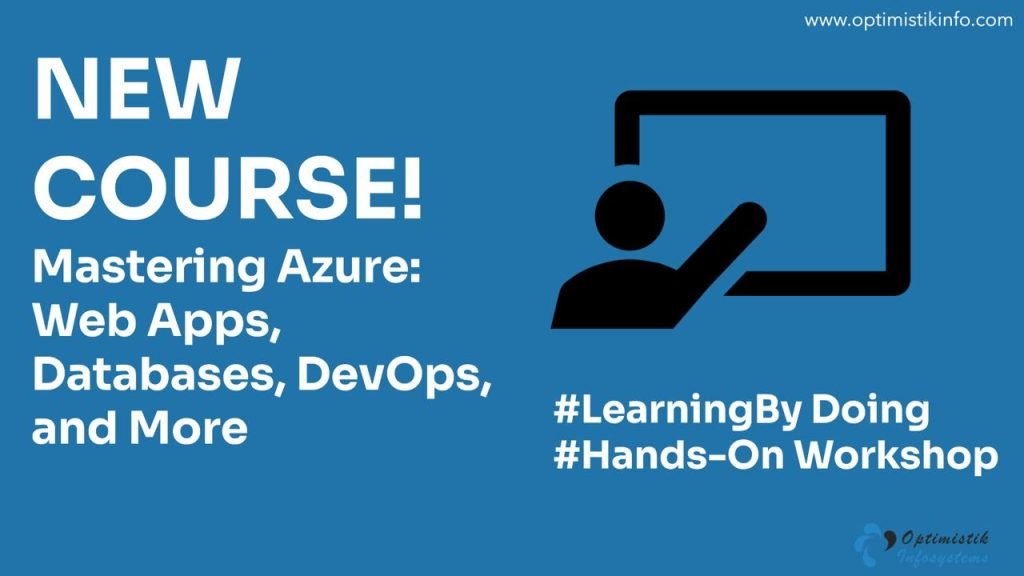Duration: 48 hours

Course Objectives:
By the end of this course, participants will:
- Gain a comprehensive understanding of Azure Web Applications, LogicApps, and Azure Functions.
- Learn how to monitor and troubleshoot applications using Azure App Insights.
- Develop skills in managing Azure SQL Server/Database and Cosmos DB.
- Master Azure API Gateway and the creation of secure, scalable APIs.
- Learn to write and deploy ARM templates (Azure Resource Manager) and Bicep scripts for infrastructure-as-code.
- Implement DevOps CI/CD pipelines using Azure DevOps.
- Understand data integration and transformation using Azure Data Factory.
Target Audience:
- Azure Developers: Individuals who work with Azure to build and maintain web applications, databases, and APIs.
- Cloud Architects: Professionals designing solutions on Azure.
- DevOps Engineers: Individuals looking to implement CI/CD pipelines in Azure DevOps.
- System Administrators: Admins responsible for managing Azure infrastructure and applications.
- Data Engineers/Analysts: Professionals working with data solutions on Azure, specifically Azure Data Factory and Cosmos DB.
Course Outline:
Module 1: Introduction to Azure & Web Applications (6 hours)
- Overview of Azure services and infrastructure
- Web Applications in Azure:
- Creating and deploying Azure Web Apps
- Configuring App Services and scaling
- Application settings and diagnostics
- Objective: Participants will be able to create, deploy, and manage scalable web applications on Azure.
- Key Takeaways:
- Understand Azure App Services and web app hosting.
- Learn about scaling, troubleshooting, and monitoring web applications.
Module 2: Azure Logic Apps & Functions (6 hours)
- Logic Apps:
- Introduction to Logic Apps and workflows
- Integration with other Azure services
- Creating and automating workflows using templates
- Azure Functions:
- Introduction to serverless computing
- Developing and deploying Azure Functions
- Monitoring and managing functions
- Objective: Participants will understand how to build automation workflows using Logic Apps and serverless applications using Azure Functions.
- Key Takeaways:
- Create efficient Logic Apps workflows.
- Develop serverless solutions using Azure Functions.
Module 3: Application Insights (4 hours)
- Overview of Application Insights
- Setting up Application Insights for Web Apps
- Monitoring performance, exceptions, and diagnostics
- Analyzing telemetry data and setting up alerts
- Objective: Participants will be able to use Azure Application Insights to monitor applications, diagnose issues, and improve performance.
- Key Takeaways:
- Use Application Insights for monitoring and diagnostics.
- Set up custom alerts and analyze telemetry data.
Module 4: Azure SQL Server and Cosmos DB (6 hours)
- Azure SQL Server/Database:
- Overview of Azure SQL Database and deployment
- Configuring and scaling SQL databases
- Backup, security, and performance tuning
- Cosmos DB:
- Introduction to Azure Cosmos DB
- Creating and managing NoSQL databases in Cosmos DB
- Understanding consistency models and scaling
- Objective: Participants will be able to work with Azure SQL and Cosmos DB for data management.
- Key Takeaways:
- Deploy and manage Azure SQL databases with high availability.
- Utilize Cosmos DB for global NoSQL data storage and management.
Module 5: Azure API Gateway (4 hours)
- Overview of Azure API Gateway:
- Creating, managing, and securing APIs with Azure API Management
- Routing, versioning, and scaling APIs
- Setting up authentication and authorization for APIs
- Objective: Participants will gain hands-on experience in creating and managing APIs using Azure API Gateway.
- Key Takeaways:
- Build and manage secure APIs in Azure.
- Implement routing, versioning, and security for APIs.
Module 6: ARM Templates and Bicep (4 hours)
- ARM Templates:
- Introduction to Azure Resource Manager (ARM)
- Writing and deploying ARM templates
- Resource management with templates
- Bicep:
- Overview of Bicep as an alternative to ARM templates
- Writing, testing, and deploying Bicep code
- Objective: Participants will understand how to automate infrastructure deployment using ARM templates and Bicep.
- Key Takeaways:
- Write and deploy infrastructure as code using ARM templates and Bicep.
- Automate the deployment and management of Azure resources.
Module 7: DevOps CI/CD Pipelines (6 hours)
- Introduction to Azure DevOps:
- Setting up Azure DevOps projects and repositories
- Creating CI/CD pipelines for automated deployment
- Integrating Azure DevOps with GitHub and other tools
- Implementing CI/CD Pipelines:
- Building, testing, and deploying applications automatically
- Continuous integration, testing, and delivery with Azure Pipelines
- Objective: Participants will learn to create and manage CI/CD pipelines in Azure DevOps for automation.
- Key Takeaways:
- Understand the complete DevOps pipeline lifecycle in Azure.
- Implement automated CI/CD pipelines for application deployment.
Module 8: Azure Data Factory (6 hours)
- Overview of Azure Data Factory:
- Introduction to data integration and ETL processes
- Creating and scheduling data pipelines in Data Factory
- Integrating on-premise and cloud data sources
- Advanced Data Factory Concepts:
- Data transformation and monitoring
- Handling errors and performance optimization
- Objective: Participants will be able to design and implement data pipelines in Azure Data Factory.
- Key Takeaways:
- Design data workflows and perform ETL tasks.
- Manage and optimize data flows in Azure Data Factory.
Course Methodology:
- Practical Exercises: Each module will include practical exercises to help participants apply their learning.
- Discussions and Q&A: Interactive discussions and Q&A sessions will be incorporated throughout the course.